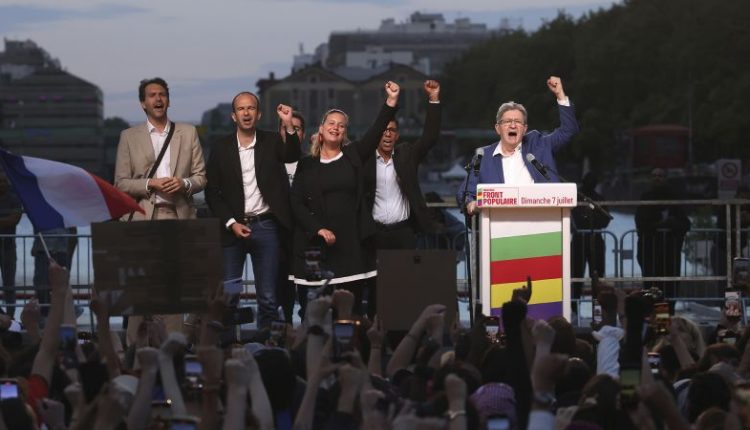French stocks and government bonds struggled to find direction Monday following surprise results in France’s parliamentary elections, which saw left-wing parties outperform the far right Sunday, leaving the country’s parliament facing gridlock.
The yield, or return sought by investors, on benchmark 10-year bonds rose by a fraction of a percentage point to 3.22% by 8.09 a.m. ET. But the premium traders demand to hold French bonds instead of the ultra-safe German equivalents was lower on the day. However, it was still a lot higher than before French President Emmanuel Macron called the snap elections on June 9.
French markets have been unsettled ever since Macron’s shock decision, which came after his Renaissance party lost to the far right in a vote for European Union lawmakers earlier in June. The 46-year-old centrist has driven pro-growth economic reforms in Europe’s second-biggest economy, which investors fear could now be rolled back under a very different parliament.
Analysts at Rabobank said Monday that uncertainty over the composition of the next government was likely to keep the risk premium on French government bonds — the so-called spread over German debt — at “elevated levels” compared with before Macron announced the snap elections.
France’s left-wing alliance, the New Popular Front, came in first after the second-round vote Sunday, while Marine Le Pen’s far-right National Rally trailed in third place in a stunning reversal of first-round results. But with the left falling short of the 289 seats needed for a majority and with a weakened president, the national assembly is expected to be more fractured than ever.
France is now set for a prolonged period of instability as three opposing blocs with competing ideas and agendas try to form a coalition or find themselves stuck in a state of paralysis.
“The so-called ‘Republican Front’ whereby parties co-operate to block the far right’s ascendance to power proved remarkably successful but leaves the parliament split,” the Rabobank analysts wrote in a note Monday. “We are now likely looking at a period of policy paralysis.”
France’s CAC 40 index, which represents 40 of the biggest companies listed in Paris, was up 0.14% by early afternoon local time, reversing a fall notched earlier in the day. The index has dropped 3.9% since Macron called the snap elections.
The euro was trading flat against the US dollar by 8.09 a.m. ET. The value of the currency, which is shared by 19 other countries in the EU, has swung wildly since June 9.
A gridlocked parliament raises the specter of a government unable to pass key reforms, including measures to reduce France’s huge government debt pile, which was equal to 110.6% of the country’s gross domestic product at the end of last year.
The budget deficit — the difference between what the government spends and what it receives in taxes — reached 5.5% of GDP last year.
The New Popular Front has made sweeping spending commitments, including a substantial increase to the minimum wage and a freeze on prices for many essential goods.
Holger Schmieding, chief economist at bank Berenberg, called the group’s plans “unaffordable” in a note Monday.
“(The election result) threatens to exacerbate France’s fiscal problems,” he wrote, adding that France would likely struggle to pass a budget for next year that complied with EU rules.
“The strong showing for the united left as a whole makes it difficult for the moderate left to break ranks with the far left and ditch the most expensive parts” of the New Popular Front’s fiscal plans, Schmieding added.
Hanna Ziady contributed reporting.
Read the full article here

